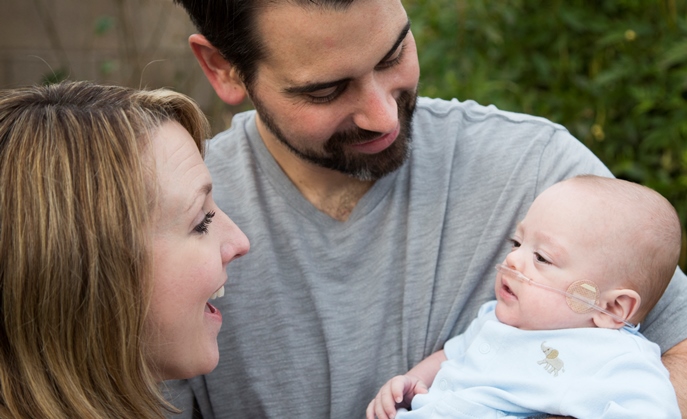
On High Alert: When complications threaten the life of mother and child
At 16 weeks pregnant, Melissa Duarte was already busy keeping up with two young sons,unsuspecting that life could get any more chaotic. But then her water broke—threatening to end the life ofher unborn baby.
Melissa was raced to the Maryland hospital where her husband, Andrew, was completing an interventional radiology fellowship. He was quickly by her side, dreading the worst but hoping for the best.
The news was not good: Melissa had lost all amniotic fluid, and the doctors told the Duartes that keeping the baby alive was nearly impossible. Even worse, it was extremely risky for Melissa’s health. Yet they had just seen their baby, via an ultrasound—his heart still beating and his little limbs moving. How could they not do everything possible to give him the chance to live?
Instead of giving up hope, they phoned the director of maternal fetal medicine at Dignity Health St. Joseph’s Hospital and Medical Center, Linda Chambliss, MD, MPH, who had helped with the couple’s first pregnancy, also high risk. She gave them the sense of confidence they desperately sought. Within days, the Duartes boarded a plane for Phoenix, frantically hoping to save their baby’s life.
Destination: World-class care
St. Joseph’s Hospital is home to the Center for Women’s Health, where a team of physicians, nurses and support staff provides comprehensive services for women throughout every stageo f life—from well visits, family planning, labor and delivery, cancer screening and treatment, to pelvic infections and disease, menstrual irregularities, fibroids, endometriosis and management of menopausal symptoms.
“Our team treats all aspects of a woman’s health, including mind, body and spirit,” says Mary Steigerwald, RN, MBA, director of regional operations for St. Joseph’s women’s services. “We offer a full range of wellness care through our division for obstetrics and gynecology, but we are different from other providers because we also provide the most advanced care possible for high-risk pregnancies through our maternal fetal medicine division.”
This caliber of care has enabled St. Joseph’s to become a destination hospital for women’s services, attracting patients from across the state and beyond, she adds.
It certainly was true in the case of the Duartes, who trusted th eexpertise at St. Joseph’s over any other hospital in the country. After arriving on campus, they were surrounded by an expert team that made Melissa’s safety a top priority while also focusing on the safe development of her unborn baby.
Although her condition was stabilized, within nine weeks Melissa began hemorrhaging—seriously jeopardizing her life and that of her baby. Once again, the team at St. Joseph’s—including perinatologists, trauma surgeons,urologists and support staff—sprang to action.
“I didn’t think my son would make it, but I hoped they could save my wife,” says Andrew, remembering the moment he watched Melissa being rushed to surgery.
And baby makes five
As soon as Victor Duarte entered the world on June 29, 2015—weighing 1 pound, 10 ounces—he was whisked away to the nursery intensive care unit of St. Joseph’s, home of the state’s most advanced neonatal program for premature babies.That’s where he would spend the first six months of his tiny life, while nurses and physicians tended to his every need, supplemented with an outpouring of love from his dad and mom.
At the same time, Melissa was slowly regaining her strength and mentally preparing for her busy life ahead, raising three young boys.
“I am so thankful for the doctors and the nurses who were extremely compassionate during our stay,” says Melissa.The sentiment is echoed by her husband. “The team at St. Joseph’s saved my wife’s and my son’s lives,”says Andrew. “I couldn’t be more grateful.”